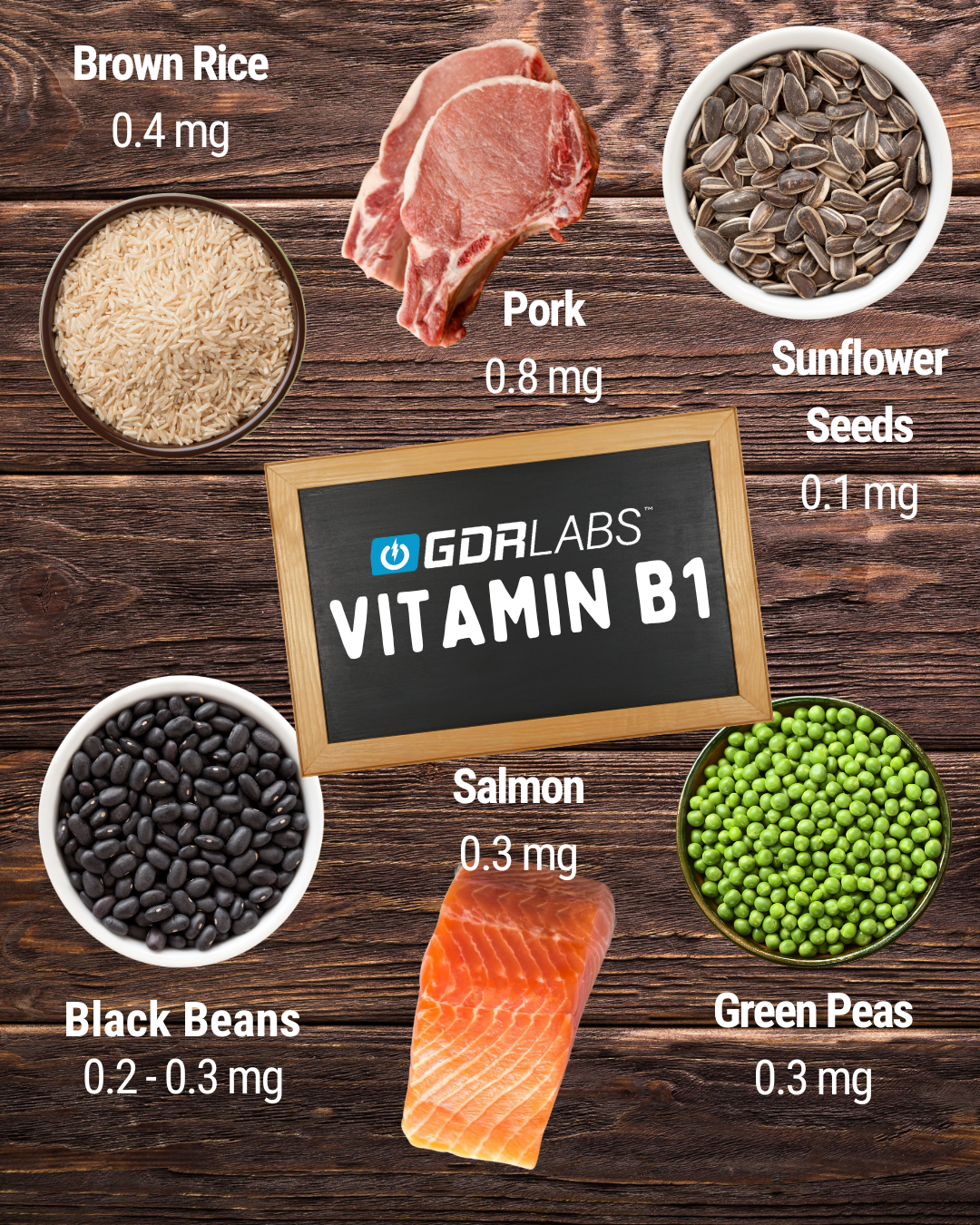To B1 or not to B1; Natural, Whole-Foods vs. Synthetic ThiamineUpdated 8 months ago
To B1 or not to B1; Natural, Whole-Foods vs. Synthetic Thiamine

Vitamin B1 (scientifically referred to as thiamine) rarely gets the spotlight, but it absolutely should for many reasons. This essential nutrient is paramount for the maintenance of a healthy nervous system, converting food (carbs especially) into energy, and supporting heart and muscle function! Quite a bit for a Vitamin that gets stuffed into a complex with little regard…
While supplements are available for Vitamin B1, getting your daily dose naturally through food can offer additional health perks. Let’s talk about why natural sources are best for your B1 supplementation and what foods you can focus on consuming to help you meet your recommended intake.
Why Does Vitamin B1 Matter?
Thiamine is part of the B-complex family, which helps your body use carbohydrates for fuel. In particular, B1 helps enzymes break down glucose (the simplest sugar), making it vital for energy production in the body. However, it’s also crucial for:
- Highly Functioning Nervous System Health: B1 supports nerve function and communication between neurons, allowing for your CNS and PNS efficiency.
- Continued Heart Health: B1 has been proven to aid in proper heart muscle function.
- Overall Brain Function: Low levels are linked to mood disturbances, fatigue, and cognitive decline.
Since thiamine is water-soluble, it cannot be stored in the body’s adipose tissue (fat) in large quantities, meaning you need a steady daily intake through your diet.
Natural vs. Synthetic: Why Food Sources Are Better for Your B1 Intake
While synthetic vitamin B1 in supplement form is as effective as any well-manufactured and tested synthetic, natural sources provide a broader nutritional profile, including other vitamins, minerals, and fiber. Eating thiamine-rich foods also promotes better absorption, has been shown to support overall diet quality, and can encourage healthier eating habits across your lifetime!
How Much Do You Need: Recommended Daily Intake of Vitamin B1
The Recommended Dietary Allowance (RDA) for thiamine (Vitamin B1) varies by age and gender:
- Adult men: 1.2 mg per day
- Adult women: 1.1 mg per day
- Pregnant/lactating women: 1.4 mg per day
Luckily, achieving these targets through the consumption of whole foods is not only simple but entirely delicious!
What Are Some Top Natural Sources of Vitamin B1
Let’s talk turkey… or pork, actually. Here are some excellent food sources of thiamine:
1. Whole Grains
- Brown rice, oats, and whole wheat bread are rich in thiamine.
- Avoid heavily processed grains, like white rice or refined flour, as refining removes most B vitamins from whole foods.
2. Legumes
- Lentils, black beans, navy beans, and pinto beans are great options.
- Just 1 cup of cooked lentils can provide about 0.3 mg of B1!
3. Nuts and Seeds
- Sunflower seeds are a thiamine powerhouse! A mere quarter cup provides nearly 1 mg, almost your entire RDI!
- Macadamia nuts and pistachios are delicious substitutes that also contribute modest amounts.
4. Pork
- One of the richest animal sources of vitamin B1.
- A 3-ounce serving of cooked pork chop can contain up to 0.8 mg! YUM.
5. Fish
- Trout, tuna, and salmon offer good B1 levels, AND you benefit from heart-healthy fats, like omega-3s.
6. Vegetables
- Green peas, asparagus, Brussels sprouts, and spinach provide smaller, helpful amounts. Think GREEN!
Some Final Thoughts: Make B1 a Number 1 Habit
Getting enough vitamin B1 naturally is easier than you might think, as you have learned from reading above. A bowl of oatmeal topped with sunflower seeds and a handful of legumes can go a long way to obtaining your RDI of Thiamine. Make sure to focus on a varied, whole-foods diet that incorporates grains, legumes, seeds, lean proteins, and vegetables, and your thiamine needs will be well covered. Then, you can ditch the pricey, synthetic multi-vitamin!
On top of that, by choosing food sources to obtain your vitamins, you’re fueling your cells with B1 and benefiting from the “synergistic” (fancy for “work together”) nutrients that support total, overall health and wellness.
Quick Tip: If you drink significant amounts of coffee or alcohol, your B1 levels may already be lower than you think, as both can inhibit its absorption. Keep that caffeine and libation spirit alive by considering a boost to your intake with more thiamine-rich foods.
Want to eat smarter? Let vitamin B1 be your starting point — your nervous system, heart, and brain will thank you! And don’t forget to stay involved with our blog series, “Vitamins, Naturally,” to learn more. See you again soon!